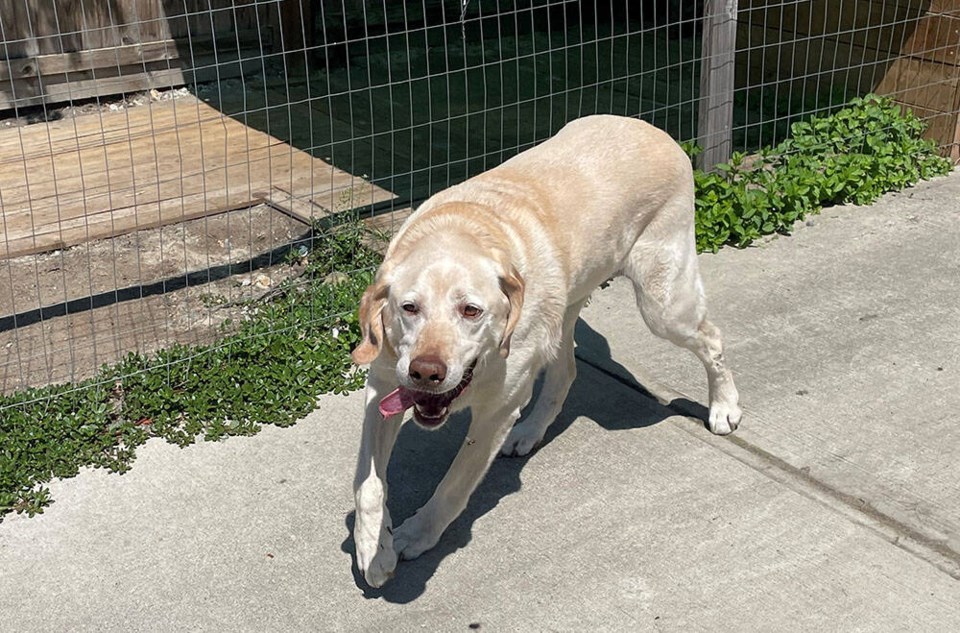In her 43 years with the BC SPCA, Eileen Drever has never heard of police being needed to protect a doxxed dog owner.
The senior protection officer was referring to Hugo the dog and the viral social media campaign that targeted its owner, resulting in the Richmond RCMP being stationed at the house.
The RCMP have warned they are investigating this “mischief” after people were driving to the house and harassing the owner.
“I find it so frustrating when I know we’ve attended and there’s no concern,” Drever said. “Haters continue to hate and there’s nothing we can do.”
This all followed a poster and online campaign, identifying the address of the owner as well as giving out the phone number of the mayor’s office, that appealed to the public to report supposed neglect of Hugo.
The BC SPCA investigates all complaints they receive of animal neglect, and they will issue notices if they find any abuse or neglect.
While Drever couldn’t talk about details about Hugo, she said no notification has been issued to the owner.
While the Richmond News was visiting with Hugo and its owner on Thursday afternoon, a black truck drove by the home and the driver hurled insults out of his rolled down window.
It was the third car that drove by in the 10-minute span the News was there, slowing down to look for the dog.
Unfortunately, a mob mentality has taken hold of Hugo's situation, with police reporting the owner was being “mercilessly harassed.” Despite the warning from police, and the city’s and SPCA’s statements saying the dog is fine, the harassment has continued online and at the owner’s home.
Drever said people’s love of animals is a double-edged sword – on the one hand, it’s good that people are passionate, on the other hand, it can go overboard.
To keep hounding an animal owner after an investigation has been closed is “totally unacceptable,” she added.
Hugo’s owner didn’t want to be interviewed for the story nor give his name.
But he did say he’s not keeping Hugo outside anymore as he’s worried the dog will be stolen.
The SPCA investigates for both physical and psychological abuse, relying on experts such as certified animal behaviourists and veterinarians to assess any animal that’s the subject of a complaint.
After investigating, the BC SPCA gives the owner the opportunity to rectify the situation. But, if they’re not cooperative, they can apply for a warrant to seize the animal.
Part of the problem might be that Hugo is an outside dog, Drever said, and many people don’t believe dogs should be kept outdoors.
But it’s more stressful for Hugo to be indoors, she added. That’s just his nature.
Targeting someone on social media goes against guidelines
Animal welfare stories resonate with the public, explained an SFU media expert.
They appeal to the public even more when the animal is named and has had interaction with humans, said Ahmed Al-Rawi, SFU associate professor of news and social media with the School of Communication.
These two elements create the perfect breeding ground for a viral story.
He cited the examples of a gorilla at the Cincinnati Zoo, Harambe, and the Norwegian walrus Freya, both of which were euthanized because of interaction with people. Subsequently, there was broad outrage from the public over both these cases.
Hugo the dog’s case seems to have particular appeal to people because the dog, like Harambe and Freya, is named and it has interacted with people.
After the News published the story, comments on social media platforms continued to include more accusations of neglect.
Not only is such a social media campaign illegal, it’s immoral, even if someone were mistreating an animal, said Al-Rawi.
“Even if that person was wrong, you can’t disclose (the address) because it can endanger their life,” he said. Rather, he added, any allegations should be reported to the police or the SPCA whose job it is to respond.
It also goes against social media guidelines, he said, but, unfortunately, social media companies don’t often go after small, local stories, only focusing on misinformation if it's high profile, such as Donald Trump’s election claims or anti-maskers.
Despite social media companies having the money and resources to shut down such misinformation, “in the end, they’re not doing enough,” Al-Rawi said.
If anyone thinks an animal is in distress, Drever encourages them to call the animal helpline at 1-855-622-7722.
The BC SPCA gets 8,000 complaints a year, and they take “each and every one seriously,” Drevers explained.
“Please trust us when we say ‘there’s no problem’ that there’s no problem,” she added.




